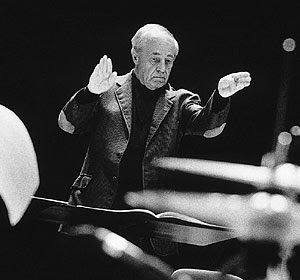Fêting Pierre Boulez
 Pierre Boulez is 82 years old. Although he made the decision to step down from his regular appearances at the Bayreuth Festival a couple years ago, he is still going strong. Four Parisian institutions -- the Orchestre de Paris, Ensemble Intercontemporain, the Salle Pleyel, and the Cité de la musique -- are honoring Boulez right now, with four concerts by the Orchestre de Paris, three of them directed by Boulez. Renaud Machart has a review of the first one (L'oeil vif et le geste précis de Pierre Boulez, November 30) for Le Monde (my translation):
Pierre Boulez is 82 years old. Although he made the decision to step down from his regular appearances at the Bayreuth Festival a couple years ago, he is still going strong. Four Parisian institutions -- the Orchestre de Paris, Ensemble Intercontemporain, the Salle Pleyel, and the Cité de la musique -- are honoring Boulez right now, with four concerts by the Orchestre de Paris, three of them directed by Boulez. Renaud Machart has a review of the first one (L'oeil vif et le geste précis de Pierre Boulez, November 30) for Le Monde (my translation):The Salle Pleyel was bursting at the seams on Wednesday, November 28, for the opening night of the series, a few weeks away from the 40th anniversary night (December 20) of the Orchestre de Paris. Pierre Boulez was opposed to its formation, quarreling with André Malraux, then Minister of Culture, and leaving France for some ten years. The years have passed. Boulez is still not afraid to speak out and, at 82 years old, continues to have a bright eye, a good ear, and a precise gesture. Do the audiences come for his music (tonight, Le Soleil des eaux) or for his conducting? Whichever it is, his programming is "organic" and impassioned, even if he is always crossing the same ocean, inevitably marked with Berg, Webern, Messiaen, and Stravinsky (but missing Schoenberg, Bartok, Debussy, and Ravel this time, the other regulars on Boulez programs since the beginning).
The November 30 concert by the Ensemble Intercontemporain at the Cité de la musique made a typical, fascinating thematic connection by pairing selections from the 7th book of Monteverdi's madrigals with Le Marteau sans maître, Boulez's 1955 cycle based on poetry by René Char (1907-1988). That sounds remarkable.
No, Boulez does not conduct drily: his Webern Passacaglia that night was venemous, almost gyrating, his Stravinsky Noces a model of bounce and jubilation (in spite of an unsatisfactory lack of balance, from the first balcony, among the percussion, the four pianos, and the solo voices). To be sure, the Orchestre de Paris would play Berlioz's Symphonie Fantastique more easily than Chronochromie, one of Messiaen's most daunting scores. But do we hear Chronochromie and Noces all that often? And with the exception of Notations, is Boulez's orchestral music (whether you like it or not) played all that frequently? If it were only for these reasons, this cycle deserves to exist.





















































No comments:
Post a Comment